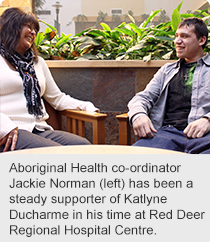
May 29, 2013
Story by Adam Eisenbarth
Photo information: Aboriginal Health co-ordinator Jackie Norman (left) has been a steady supporter of Katlyne Ducharme in his time at Red Deer Regional Hospital Centre.
It hasn’t been an easy life for Katlyne Ducharme. The 22-year-old has battled alcohol and drug addiction for much of his life.
But as he takes the steps to turn his life around at Red Deer Regional Hospital Centre, Ducharme is thankful for the support he’s receiving from Jackie Norman, an Alberta Health Services Aboriginal Health co-ordinator.
“Jackie comes to visit me at the unit from time to time. She’s been really supportive and has helped me realize that I can get through this, and start helping others like she is.”
Norman is one of three Aboriginal Health coordinators in Central Zone. Along with her office in Red Deer, she is also stationed in Ponoka. The co-ordinators have been in place for more than a year now.
“We’ve seen a real need for a cultural advisor who can provide support and be there for the Aboriginal population,” says Norman.
“Since this is a fairly new position, much of our work has involved reaching out to First Nations communities and health care providers to get a sense of the needs of each area.”
The co-ordinators address a wide range of potential obstacles, including language barriers, cultural differences, transportation issues, system navigation and more.
“Often when our clients come from reserves, they’ve never accessed the health care system before,” says Claudette Yellowbird, a co-ordinator based in Wetaskiwin.
“It can be a culture shock when they walk into the hospital for the first time. We help explain to health care providers the cultural and social perspective that our clients are coming from.”
For 100-year-old Louisa Wildcat, Yellowbird’s presence in the hospital is crucial. Wildcat was hesitant to enter the hospital until she discovered a Cree-speaking supporter would be there.
“I am very happy from the bottom of my heart to hear that liaisons were hired to work with our Aboriginal people in the hospitals,” says Wildcat in her Native language, with Yellowbird’s interpreting.
“I never really wanted to use this service knowing that communication would be a problem because I speak fluent Cree.
“Now that I am in care, I have full support from the Aboriginal Health co-ordinator who interprets and advocates for me and for my family.”
The Aboriginal Health co-ordinators are available to all Aboriginal people who access health care in Central Zone. This includes Status and Non-Status First Nations, Metis and Inuit.
They also support all health care providers in Central Zone, who require information or assistance in caring for their Aboriginal patients or residents.